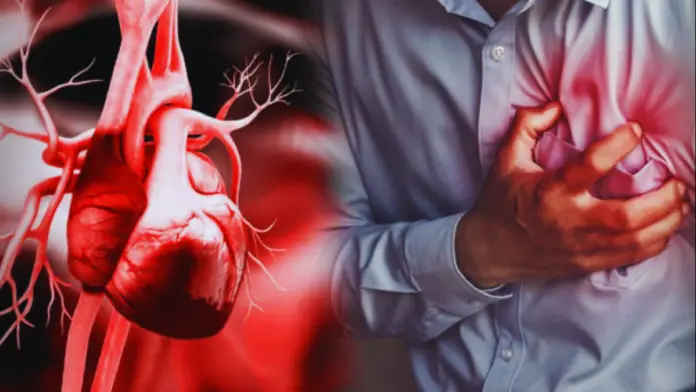Intermittent Fasting Heart Disease- People opt to fast—forgo food and liquids for a predetermined amount of time—for a variety of reasons, including to fulfil health objectives and commemorate religious holidays like Ramadan.
Eating and drinking are restricted to specific times of the day during some fasts. Some advise restricting meals to one or more days per week. You might be curious about how eating in this manner could impact heart health if you have heart disease.
It depends on the kind and severity of your cardiac problem, says Henry Ford Health cardiologist Muhammad Alqarqaz, M.D. According to research and professional opinion, many heart disease patients can safely fast. According to certain research, fasting can lower inflammation, improve blood pressure regulation, and help people lose weight. Your physician can determine whether
What is Intermittent Fasting Heart Disease?
An eating schedule that emphasises when to eat rather than what to eat is called intermittent fasting (IF). Many others, including the younger generation, find this pattern to be fascinating. It establishes the pattern for when to eat and when to fast.
Therefore, it is more accurately described as a shift in eating habits than a traditional diet. Let’s talk about five common forms of intermittent fasting (IF) out of the many varieties that exist.
Popular Types of Intermittent Fasting
There are so many types of Intermittent Fasting (IF), if you are interested in following Intermittent Fasting, check with your doctor or dietician and choose one of these 5 famous types of Intermittent Fasting (IF).
5:2 Fasting:
One of the most popular IF method. The main purpose of 5:2 is that for 5 days you eat your normal food without counting any calories and other 2 days, you have a calorie-restricted meal. For a woman, it is set at 500 kcal and for a man, it is 600 kcal. The reason this is a famous method is because for many dieting for 7 days becomes challenging. And fasting for 2 days becomes convenient for them as they can look forward to the feast days.
16:8 Fasting:
The 16:8 method includes fasting for 16 hours and eating your normal food for 8 hours. For example, you start at noon and stop at 8 pm and then fast till the next day at noon. Following this method can be simple because we need not eat after dinner and skip our breakfast. Drinking green tea, coffee or water is allowed, which can help keep hunger at bay. For women, it is recommended to fast only for 14 hours as their metabolism works better compared to men.
Royal Challengers Bengaluru Women’s Team of 18
Eat-Stop-Eat:
As the name suggests, you eat and then choose two days out of 7 days a week. So, you fast from dinner one day to the next day at dinner time. It depends totally on how you wish to choose the distance, whether it is from one breakfast to another breakfast or lunch to lunch. Water, coffee and tea are allowed which do not add any calories to your diet. The only downside of this fast is that full 24-hour fasting may be difficult to follow. You can start by fasting for 14 – 16 hours and then gradually fast for 24 hours.
Overnight Fasting:
This one is the simplest of all. It involves fasting for 12 hours every day. This means if you have your dinner at 8 pm, you can resume eating only after 12 hours that is at 8 am the next morning. Since this method is almost impossible to achieve, it is one of the most popular ones too. But it may provide milder cellular benefits as compared to the others.
5 Alternate Day Fasting:
You have to fast every alternate day in this type of intermittent fasting. Another version of the same allows up to 500 kcal on a fasting day. This one is not recommended for beginners.
May Improve Heart Health:
Many human studies have been conducted on the benefits of intermittent fasting and one of them has shown to reduce LDL cholesterol, blood triglycerides, blood sugar and blood pressure levels. These are all risk factors for heart disease.
Helps Reduce Insulin Resistance:
Intermittent fasting can reduce insulin resistance and hence helps to lower down blood glucose levels. This can protect against type – 2 diabetes. Human studies showed fasting blood sugar was reduced by 3-6% while fasting insulin was reduced by 20-31%.
Additional advantages, according to research on humans:
It may aid in preventing damage from free radicals.
It may aid in the prevention of some malignancies.
It is thought to be beneficial to the brain because it increases brain-derived neurotrophic factor (BDNF); in humans, a lack of this hormone may be a sign of depression and other brain issues.
Security and Adverse Reactions
Don’t follow intermittent fasting mindlessly. Overeating is the biggest adverse impact of IF. It may weaken you, impair your ability to concentrate, and occasionally leave you agitated and grumpy. This is a transient emotion that will pass with time.
However, before beginning this type of fasting, you should speak with your doctor about a few specific medical issues. Among these ailments are diabetes,
Safety and Side Effects
Intermittent Fasting should not be followed blindly. The main side effect of IF is excessive hunger. It can make you feel weak, may affect your concentration power, and sometimes leave you irritated and cranky. This is a very temporary feeling and can be overcome with time.
But, there are a few medical conditions where you should consult your doctor before going ahead with this kind of fasting. These conditions include diabetes, being underweight, kidney transplant, on medications, high blood pressure etc.
Nevertheless, no safety study has been conducted on Intermittent Fasting (IF) and hence we advise you to follow it under healthcare supervision.

See Your Cardiologist Before Fasting
Every person with heart disease has different medical needs. One person with heart failure may be able to fast while another person with more severe disease should not.
Your cardiologist can determine whether fasting—for religious reasons or to lose weight—is safe for you by:
Assessing your current heart health
Reviewing your medications
Evaluating other health conditions that could worsen with fasting
“If you have stable heart disease, fasting may be safe. Your doctor can explain how to adjust your medication schedule to maintain your heart health. For example, medications taken twice daily can be taken before and after fasting,” says Dr. Alqarqaz.
He cautions that people with more severe or unstable heart disease should avoid fasting. Likewise, individuals with certain genetic conditions that affect heart function, such as cardiomyopathy, shouldn’t fast.
“Some people with heart disease also have other chronic conditions like high blood pressure (hypertension), kidney disease or diabetes. For these individuals, fasting may increase the risk of dehydration and other complications,” says Dr. Alqarqaz. “If your chronic condition is under control, you may be able to fast. But check with your doctor to learn what’s right for you.”
Signs It’s Time to Give Up Fasting
You should keep an eye on your health even if your doctor has given you the all-clear to fast. Dr Alqarqaz advises that if you encounter any of the following symptoms, you should cease fasting and get medical attention:
chest ache
Feeling lightheaded or dizzy
Overwhelming exhaustion
accumulation of fluid near your ankles
Breathlessness
significant reduction in urine production
“While many heart disease sufferers find that fasting is safe, it’s not a good fit for everyone. If you are unable to fast or must discontinue fasting, it is okay to find alternative ways to observe religious traditions, according to Dr. Alqarqaz. Similarly, there are plenty of options for weight loss that can assist you in achieving and maintaining a healthy weight. Consult your physician for heart-healthy options.








